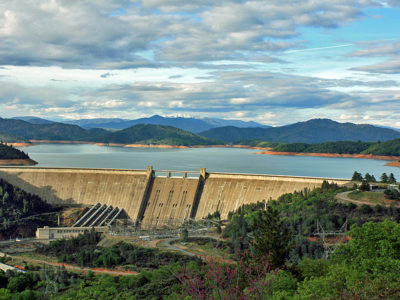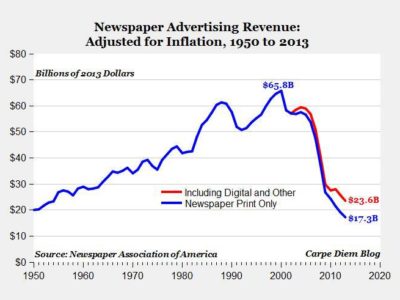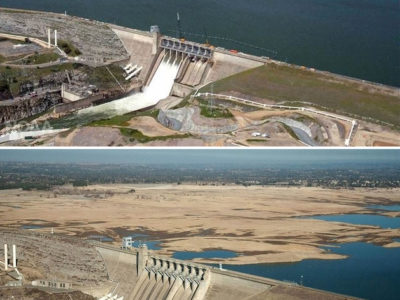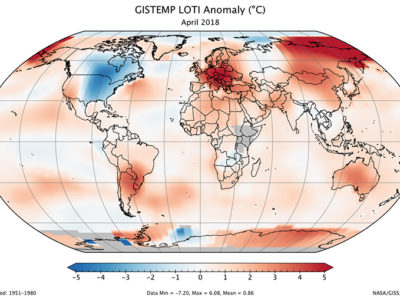Trump Administration’s Cold Water War With California Turns Hot
Feds' Curious New Lawsuits Against State Water Board Likely Just the Opening Litigation Salvo
When it comes to California water policy, the federal-state relationship has always been both strained and challenging. That intergovernmental tension harkens back at least to the Reclamation Act of 1902. In section 8 of this iconic federal statute that transformed the American West, Congress declared that the federal government "shall proceed in conformity with" state water rights law. And, in its 1978 California v. United States decision, the U.S. Supreme Court e...
CONTINUE READINGGoodbye, Cleveland!
Newspaper Collapse Threatens The Environment: Universities Need To Fill The Gap
In 1970, Cleveland's Cuyahoga River famously caught fire. This past week, we have seen an even worse environmental disaster for the city: The Plain Dealer on Monday laid off 14 newsroom employees as part of a staff reduction first announced in December. The 14, most of them reporters and all members of Local 1 of the News Guild of the Communication Workers of America, account for about a third of the unionized news-gathering staff... The Guild said in a statement tha...
CONTINUE READINGA Contingency-Based Framework to Support Drought Decision Making
Part 4 in a Series on Improving California Water Rights Administration and Oversight for Future Droughts
In my last post, I outlined actions the State Water Resources Control Board (Board) can take to improve its future drought response capabilities. Our core recommendation is for the Board to bring greater predictability, timeliness, and effectiveness to water rights administration and oversight during droughts by proactively developing a contingency-based framework to support its drought decision making. In other words, we argue that the Board should build a toolbox ...
CONTINUE READINGEconomists vs. Environmentalists: Time for Deténte?
You don't have to love economics to see it as a possible ally.
Cost-benefit analysis has long been the target of environmentalist ire. But one lesson of the Trump years has been that economic analysis can be a source of support for environmental policy -- it is the anti-regulatory forces who have to fudge the numbers to justify their actions. Most energy and environmental economists are aghast at Trump's assaults on climate change regulations -- many of them would instead favor stricter regulation over the status quo. Maybe it...
CONTINUE READINGCalifornia Adopts New, Welcome Wetlands Protection Rules
State Fills Void Left By Trump Administration's Weakening of Federal Wetlands Standards
This week California's State Water Resources Control Board adopted important new rules to protect the state's remaining wetlands resources. Enacted after over a decade of Board hearings, workshops and deliberation, those rules are overdue, welcome and critically necessary. Their adoption is particularly timely now, given the Trump Administration's wholesale assault on and erosion of federal programs designed to protect our nation's wetlands under the federal Clean Wa...
CONTINUE READINGReviving LBJ’s Vision
Maybe What We Need is a Green Great Society
Talk about a Green New Deal is rife these days, but perhaps what we should be talking about instead is a Green Great Society. Actually, Lyndon Johnson’s vision of the great society was green from the get-go, so maybe we could just call for a renewed Great Society. What the Great Society is known for now is its anti-poverty campaign. Conservatives have focused their attacks on that for decades. But the anti-poverty effort did have some clear successes that are now deepl...
CONTINUE READINGDuke Sucks: The Legal Planet March Madness Special
Why Is The University Killing Light Rail In The Research Triangle?
Like most people of intelligence and character, when it comes to NCAA basketball, I despise the Duke Blue Devils. As the precocious son of a good friend notes, "you can't spell Blue Devil without evil." I acknowledge Mr. Mxyzptlk's Mike Krzyzewski's greatness as a basketball coach, but it's too much to put up with garbage quotations like this: “I don’t look at myself as a basketball coach. I look at myself as a leader who happens to coach basketball.” Oh plea...
CONTINUE READINGTrump’s “Great Honor” to Fund the Great Lakes Restoration Initiative is a Great Falsehood
Trump Mischaracterizes His Administration's Attempt to Defund Important Program to Protect Environmental Quality in the Great Lakes
Late last week, Donald Trump promised to fully fund the Great Lakes Restoration Initiative, a program of the Environmental Protection Agency that provides resources to address environmental quality issues in the Great Lakes. His hollow promise obscures the fact that the Trump administration has worked hard to dismantle this program through taking away its funding, and is especially ironic since Congress has repeatedly ignored the administration's attempts to defund an...
CONTINUE READINGRay of Hope in Eastern Europe
Environmental Issues Help Foster Victory for Democratic Forces
The world got some very good news yesterday when political newcomer Zuzana Caputova, a political newcomer, won a smashing victory in Slovakia's President elections. Unlike the right-wing authoritarians like Hungary Viktor Orban and Poland's Law and Justice Party, which have dominated east European politics in recent years, Caputova, is a political liberal, strongly committed to democracy and human rights. She supports same-sex marriage and reproductive rights. She is...
CONTINUE READINGApril, Fools, and Climate Change
Originally, an April Fool was someone who didn't realize the times are changing.
April Fool’s jokes are a curious tradition, and I started to wonder where this custom came from. The origins of April Fool’s Day aren’t known with certainty, but there’s reason to connect it with blindness to change. In 1582, France switched from the Julian calendar to the Gregorian calendar. This meant that the year began on January 1 rather than the end of March. Those who hadn’t caught up with the changing time became targets for mockery. The word “fool”...
CONTINUE READING











